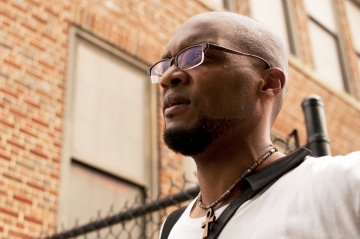Fyodor Dostoevsky’s parable The Grand Inquisitor: “Today, people are persuaded more than ever that they have perfect freedom, yet they have brought their freedom to us and laid it humbly at our feet…And we alone shall feed them…Oh, never, never can they feed themselves without us! In the end they will lay their freedom at our feet, and say to us, ‘Make us your slaves, but feed us.’”
I spent this past Saturday attending a composting workshop for an Edible Schoolyard we parents are developing at my son’s public school, preparing land for a new urban farm on The Beltline, and facilitating a Teach-In with Occupy Atlanta in the afternoon on the subject of “Food & Democracy”. As I sat in a circle with like minded people in the Vine City neighborhood discussing what it would take to for citizens to regain control of their food system in America, it occurred to me that I was completely enveloped that day in my life’s purpose. Between connecting with parents also working to bring horticultural literacy to their children’s schools and working alongside neighbors from across the city to grow food on a formally unused parcel of land, the stars in my political-social life felt fully in alignment. It was a good Earth Day and I didn’t even have to use my AK.
As discussed during the Occupy Atlanta Teach-In, “food democracy is a framework for making our food system more responsive to the needs of its citizens and decentralizing control. Tim Lang developed the term “food democracy” in the mid-1990s as a response to the increasing corporate control and lack of consumer participation in the food system. Food democracy is based on the principle that citizens or “food citizens” have the power to determine food policies and practices locally, regionally, nationally and globally. Food democracy asserts it is a right and responsibility of citizens to participate in decisions concerning their food system. (“What is Food Democracy” by Alexander Fisher, http://www.foodfirst.org)”
As I prepare to run for elected office this year as a candidate of the Georgia Green Party, I feel the responsibility of making issues of food security and sovereignty for constituents central to my campaign. With the founding of Atlanta Metro Food & Farm Network this past year, I am very involved with building the local food system needed to empower citizens to be in greater control of their most fundamental need in life. Beyond the community gardens or neighborhood urban farms however, we must have political representatives with enough experience and vision to chart a better way forward for our communities into the 21st century. I believe among other issues, the best way forward is involves a local economy based on urban agriculture. This conviction makes me a Farmer Citizen.
 “The goal of food democracy is to ensure all citizens have access to affordable, healthy and culturally appropriate foods. Food democracy emphasizes social justice in the food system, and food is viewed as the center of the democratic process. The main challenge for food democracy is moving citizens from ‘passive’ to ‘active’. Getting citizens engaged in their food system. The alternative food movement is rapidly growing, but all individuals need to be involved or ‘vote’ to create a truly representative food system. (Fisher)”
“The goal of food democracy is to ensure all citizens have access to affordable, healthy and culturally appropriate foods. Food democracy emphasizes social justice in the food system, and food is viewed as the center of the democratic process. The main challenge for food democracy is moving citizens from ‘passive’ to ‘active’. Getting citizens engaged in their food system. The alternative food movement is rapidly growing, but all individuals need to be involved or ‘vote’ to create a truly representative food system. (Fisher)”
A have a friend named Mark Winne who writes, speaks, and consults extensively on community food system topics including hunger and food insecurity, local and regional agriculture, community food assessment, and food policy. He puts it this way, “The more people see to gain control over the food they eat and their larger food system, the more they discover the intrinsic logic of addressing food issues and increasing the food security of their own communities at the local and state levels. Because of their interest in community food security, activists, parents, farmers, and anyone who feels that he or she has a dog in the fight for healthy and affordable food have been turning increasingly to food policy and food system planning. (“Closing the Food Gap” by Mark Winne)”

Me with "food citizens" at Welch Street Park Community Garden in the Pittsburgh neighborhood of southwest Atlanta.
Mark wrote another book in which he coins a term that refers to those actively involved in the movement he describes above, from which I find much inspiration for my life’s work. “Finding ways to reassert our control in the face of power, to relearn skills that have atrophied during ages of dependency and neglect, and to rediscover a triumphant kind individualism that embraces both the self and community are the tasks that confront twenty-first-century adherents of the alternative food system. (“Food Rebels, Guerrilla Gardeners, and Smart-Cookin’ Mamas: Fighting Back in an Age of Industrial Agriculture” by Mark Winne)” As a food rebel, I am committed to a food-first policy of community building and social transformation. I believe it’s the only way to have true perfect freedom.






Keep up the spirit Bro. Kwabena…..
Many thanks Sister Thembela, you continue to inspire. Blessings to you and the family. – Kwabena
Some pics from yesterday’s event.